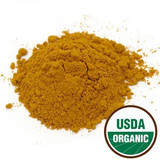

NuHerbs Lab Tested
Andrographis Herb (Chuan Xin Lian) - Cut Form 1 lb. - Nuherbs
Herbal Information for Andrographis Herb in Cut Form

Bai Dou Kou (白豆蔻), known as Cardamom in English, is a revered herb in Traditional Chinese Medicine (TCM), derived from the seeds of the plant Elettaria cardamomum.
Often referred to as the "queen of spices," cardamom, with its warm, aromatic profile and complex, slightly sweet, floral flavor, is not only a staple in culinary applications but also a significant herb in both Chinese and Ayurvedic medicine. Native to southern India and Indonesia, cardamom has a historical tradition of use, including its application by ancient Greeks for soothing digestive ailments.
Cardamom is a rich source of magnesium, with one tablespoon providing 80% of the recommended daily intake. Scientific studies have identified its antioxidant, antimicrobial, anti-inflammatory, diuretic, and antibacterial properties, which contribute to a range of health benefits.
In TCM, cardamom is used to transform dampness, move Qi, stop vomiting, and warm the middle energizer. Contemporary research supports its efficacy in preventing cavities, improving breath, maintaining healthy blood pressure and glucose levels, supporting digestion, enhancing stomach health, and potentially aiding in easy breathing.

Common Name: Cardamom Fruit, Fructus Amomi Tsao-ko, Cardamom Cluster, Cardamom, White Cardamom, Cardamom Fruit Clusters, Green Cardamom, Cardamon, Cardamum, Siam Cardamom
Botanical Name: Amomum kravanh fruit, Elettaria cardamomum
Pin Yin Name: Bai Dou Kou
Cardamom Fruit Dosage: Consult your healthcare provider for your correct dose.
Cardamom Fruit Precautions: Do not use if pregnant or nursing. Do not use with blood deficiency.
Use cardamom to make a tea, decoction, or tincture. Cardamom powder is perfect to make your own fresh filler-free capsules. Both forms of cardamon are great to use in cooking.

Cardamom Fruit Category: Aromatic Herbs that Transform Dampness
Cardamom Fruit Properties: Acrid, Warm, Aromatic
Cardamom Fruit Meridians / Channels: Lung, Spleen, Stomach
Cardamom Fruit Naturally Occurring Components: α--pinene, β-pinene, camphor, Linalool, p-cymene, nonanal, decanal, a-terpineol, neral-a,-b, geraniol, nerolidol
Apricot Kernel Ginger Scutellaria Baicalensis Turmeric Sacred Lotus
References
http://alternativehealing.org/cao_guo.htm
https://herbpathy.com/Uses-and-Benefits-of-Lotus-Cid1275
https://www.healthline.com/nutrition/cardamom-benefits
https://en.wikipedia.org/wiki/Cardamom
https://www.ncbi.nlm.nih.gov/pmc/articles/PMC6150383/
https://draxe.com/nutrition/cardamom/
https://www.americandragon.com/Individualherbsupdate/BaiDouKou.html
https://www.ncbi.nlm.nih.gov/pmc/articles/PMC5557534/


NuHerbs Lab Tested
Herbal Information for Andrographis Herb in Cut Form


Nu Herbs Lab Tested
Uncaria spp. (Gou Teng): The Hooked Vine That Calms the Mind and Balances the Body Few herbs in the world of Traditional Chinese Medicine offer the remarkable versati


Herbal Information for Eleuthero Root in Organic Powder Form Eleuthero root powder is a versatile and powerful herb that offers a host of benefits for the body and mind. Whether you're looking to...


Starwest Botanicals
Versatile 6x8 Reusable Muslin Bags: Your Eco-Friendly Solution for Tea Introducing Our Eco-Friendly 6x8 Reusable Muslin Bags: Versatile, Stylish, and Sustainable!


ActiveHerb
Cordyceps .9x Mushroom Extract Granules: Potent Energy and Immune Support Cordyceps mushroom extract granules are a concentrated form of the Cordyceps mushroom, specifically prepared for ease of


Nuherbs Organic
Herbal Information on Organic Japanese Bushy Knotweed Rhizome in Bulk Powder Form Hu Zhang: Unveiling the Miraculous Benefits of Japanese Knotweed Hu Zhang, also known as Jap


Thrive Through Fall: Immunity Power Herbs for a Healthier Season 1 pound each of Cut Astragalus Root, Cut Ginger, and Whole Forsythia Fruit. As the crisp autumn air arrives and the leaves begin...

ActiveHerb
Herbal Information for Raw Rehmannia Root Single Extract FormSheng Di Huang: A Comprehensive Overview


Z Natural Products
Herbal Information for Organic Turmeric Powder What Is The Historical Use Of Turmeric Root?Turmeric root has been used for over 4,000 years in various cultures for its medicinal, culinary, and


Plum Flower
Forsythia Fruit (Lian Qiao): Powerful Antiviral Herb for Immune Support, Detox, and Cold & Flu Relief in Traditional Chinese Medicine In traditional Chinese medicine (TCM) forsythia fruit is used...


ActiveHerb
Herbal Information on Isatis Root in 6X Extract Granule Form Unlocking the Power of Ban Lan Gen: A Comprehensive Guide to Isatis Root Powder Introducti


ActiveHerb
Herbal Information on Scutellaria Root in Concentrated Granules Comprehensive Guide to Huang Qin (Scutellaria Baicalensis)

